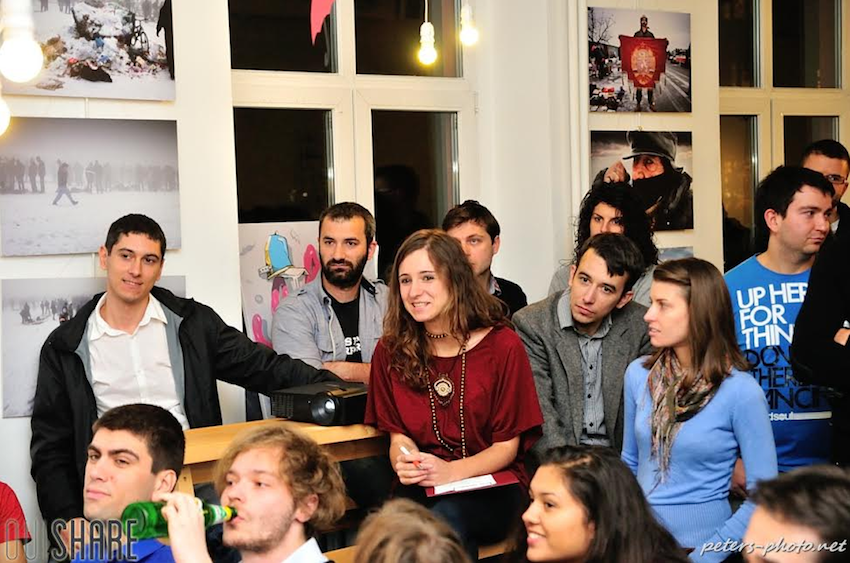We are comfortable thinking of the sharing revolution as a global trend spreading all over the planet and I can confirm this based on my recent personal experience in Chile, France and the Central and Eastern European (CEE) region. However, we should not forget to consider cultural and economic differences shaping diverse models of collaboration. After organizing five OuiShare events in four CEE countries for OuiShare’s Eastern Europe Tour, here are my takeaway messages about this region’s specificities in embracing the collaborative economy.
Most Central and Eastern European countries have been part of the European Union for nearly 10 years now, but Western countries still think of them as the former Eastern bloc with underlying differences in economic and cultural backgrounds. This is true… partly. A lot of specificities in embracing the sharing economy are coming from this cultural heritage even though generation Y has never experienced personally how it was to live in the previous era.
I’ve collected five barriers and four opportunities that these countries have to deal with in moving forward with the sharing economy agenda. First, the barriers:
Fragmented Market Structure
Contrary to the American market, the CEE region consists of several small countries which creates fragmented markets. Cities do not grow over two million inhabitants and usually economic and social activities are centralized in the capital. (Poland might be an exception following more the German structure.)
What makes the region even more fragmented is the use of different languages: every single country has its own language, different enough from the others that it is not understandable by neighboring populations. Given the fact that the sharing economy needs critical mass to develop further, these countries start with an important handicap because of their high level of heterogeneity.
Historical Heritage – Ownership Over Access
If I try to explain the concept of the collaborative economy valuing access over ownership to my mum, she would stand there unable to understand how owning a flat, a car, bike or whatever household stuff is not THE goal of your life. Indeed, for those generations who had to wait years to get a landline phone, and receiving a car could take a decade, the approach towards ownership is completely sacred.
As a participant of the Bucharest meetup mentioned, “The idea of sharing brings back negative stories from history.” In this sense, sharing can even have a negative connotation making it very tough to deliver the appropriate message about the new way the sharing economy works.
Top-Down Societies
Adapting sharing models is a tough exercise in countries where people tend to rely too much on institutions to solve their problems. With this cultural heritage, people are used to navigating themselves to comfortable situations where they do not feel the need to come up with a response on their own. They wait for the company, the State, the authorities or any other powerful body to tell them what and how to do. This top-down approach goes together with a fear from the power, the fear from going against existing rules, and the reluctance to change old habits.
Older generations in CEE are used to having a lifetime job, not feeling the pressure to look for challenges. These patterns all together make it hard to adapt bottom up initiatives. Young people are leading the way but have a difficult challenge since they have to build everything from scratch without living models ahead of them.
Lack of Online Culture
In some ways, the CEE population is not the best fit with the general profile of sharing platform users. If we only look at one indicator, online shopping, it is clear that it is still not a common habit: Romania and Bulgaria are at the bottom of the EU countries’ list, with 5% of the population doing online shopping. Hungary with 22% and Poland with 30% are doing better but there is still a long way to go until they reach Germany’s level (65%). On the other hand, these countries are on the top of the list regarding the potential growth of the online payments sectors (around 35%) so the trend is moving in a positive way.
A Culture of Distrust
While I was talking to people who were not familiar with the concept of the sharing economy and did not know about any concrete example of it, one question always came up: What if the guy hosting me does not exist or what if he is lying about the flat? What if the proposed product to swap is a fake one or is broken? Etc. Etc.
Basically, I had the impression that people were very creative about finding potential problems. They were approaching these services ready for the worst case scenario. And what was even more amazing to me is when the founder of Oszkar, a Hungarian ridesharing platform, told me that an important number of users ask him to delete all information about them and the rides they took after they leave the platform in their fear from authorities. All in all, there must be a problem with trusting in others, service providers or even in institutions.

OuiShare visionaries in Budapest
While all these cultural, historical and economic barriers may exist and should be considered by companies willing to start operating in CEE, there are numerous positive signs showing a huge potential for sharing economy platforms in the region:
Young Generations are Leading the Way
One element was common in all events that we organized in the CEE region was that every single event was coordinated by someone with experience living abroad, including myself, with five years staying in Paris and Chile. These people learned something while living away from their home and understand the importance of bringing it back to inspire people.
Thanks to European mobility and student exchange programs including Erasmus, it’s easy to experience working conditions in other EU states. Twenty somethings are encouraged to go out, see the world, and spread in their hometowns what they found interesting about it. These generations have the advantage of living without personal memories from socialist times so they are, by definition, more open to change and disruptive models. They are educating the region and leading the way to a new approach to consumption, production and work.
Startupper Boom
The hype of building your own startup has reached the CEE region recently. Some success stories like Skype from Estonia or Prezi from Hungary are inspiring youngsters who now believe that it is possible to realize your dream no matter where you started from. Incubators and accelerators are being born every month and are contributing to raise a more entrepreneurial generation. The startupper boom usually coincides with the appearance of sharing platforms and boosts the willingness to develop local copycats or even new and innovative services.
Positive Side Effects of the Economic Downturn
The effects of economic difficulties impacting the UE region are even more visible in CEE where the majority of countries are still dealing with their own currency. Macro economic difficulties spread in every aspects of people’s everyday life causing high unemployment rates while prices are still on the rise.
This external factor made people realize that the State in not an omnipotent power and cannot solve all their personal problems. People have started to become more creative, feeling more responsible about their own life and suddenly seeing ways of moving forward by themselves. This attitude coincides with the trend of moving abroad but also with more openness in trying new ways of consumption that could help them to save money or earn save extra income.
Sharing Economy Pioneers are Doing a Really Good Job
On my road from Sofia, through Bucharest, Cluj-Napoca, Budapest and Warsaw, I had the chance to meet with more than 50 entrepreneurs leading the way towards a collaborative society on the local level. These initiatives are still very young but have a huge potential in changing people's mentality towards ownership.
From ridesharing platforms through fablabs, coworking places and swapping marketplaces, everything is present in the region. Often what happens is that entrepreneurs tap into the sharing movement without even knowing about the existence of a global trend. This organic development is just another sign that shows how appropriate it is to talk about the sharing movement spreading all around CEE.
As an entrepreneur at the OuiShare Bucharest event said, “The concept of sharing economy was born in countries where the market and communities are organized in a very different perspective, and we are not quite there yet.” This underlies the cultural differences mentioned above. But I have to say, of course, and it just it has to be. The goal is not to copy existing systems from abroad but to get inspired by models working efficiently and adapt them to local communities’ structure and needs.
Just as it happened with the startups in general, a success story would help to bring the sharing economy to the next level in CEE. I cannot wait to see that next episode.
##
Top photo: Sharing movement participants in Sophia.
##
Please support Shareable! Watch the two-minute video below & donate to our crowdfunder.









